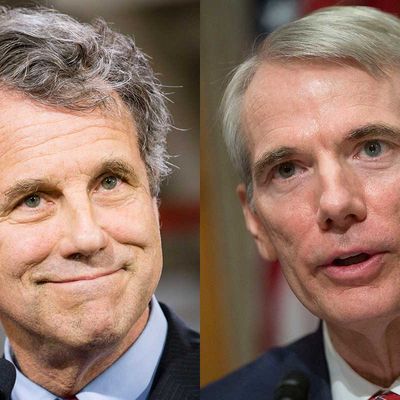
One of the most common topics of discussion among political commentators looking ahead is the exceptional number of Democratic senators up for reelection in 2018 who represent states won by Donald Trump on November 8. There are ten of them — Senators Baldwin, Brown, Casey, Donnelly, Manchin, McCaskill, Nelson, Stabenow, Heitkamp, and Tester — and their fate has become central not only to prognosticators already focused on the midterms, but to those trying to figure out who if any will cross the line to help Trump in the interim. (For instance, Joe Manchin has already announced he’ll support confirmation of Jeff Sessions as attorney general).
The assumption that these senators will come under terrible pressure to bend to Trump’s will makes sense in some cases, such as senators like Manchin and Heidi Heitkamp who have some actual issue positions in common with the president-elect and represent states he carried by massive landslides (West Virginia by 42 points, North Dakota by 36 points).
But let’s not forget: after the 2008 elections the shoe was on the other foot. In fact, it was a big hobnailed boot since Barack Obama did a lot better against John McCain than Trump did against Hillary Clinton. Republican senators famously refused to cooperate much at all with Obama (yes, three of them voted for an economic stimulus bill they managed to diminish in size and impact, but one of them — Olympia Snowe — was headed for retirement and another — Arlen Specter — was about to switch parties).
Only two Republican senators from ’08 Obama states ran for reelection in 2010 (Burr and Grassley). They both won. But Republicans held three other Senate seats in the Obama states of Florida, New Hampshire, and Ohio, and picked up four more seats in Obama states previously held by Democrats (Illinois, Indiana, Pennsylvania, and Wisconsin).
The point to keep in mind is that presidential wins — especially very narrow wins like Trump’s in Florida, Michigan, Pennsylvania, and Wisconsin — are not necessarily good predictors of Senate (or other) races in subsequent midterms. Indeed, the party controlling the White House usually loses congressional seats in midterms, and if Trump and the GOP Congress do some of the very unpopular things they have promised to do, the 2018 backlash could be pretty big. Just ask the Democrats who were swept away in 2010 — or the Republicans running in Obama ’08 states with bull’s-eyes painted on their backs who not only survived but thrived in the midterms.






























